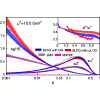How Authoritarian Governments Decide Who Emigrates: Evidence from East Germany
IF 4.5
1区 社会学
Q1 INTERNATIONAL RELATIONS
引用次数: 0
Abstract
Most autocracies restrict emigration yet still allow some citizens to exit. How do these regimes decide who can leave? We argue that many autocracies strategically target anti-regime actors for emigration, thereby crafting a more loyal population without the drawbacks of persistent co-optation or repression. However, this generates problematic incentives for citizens to join opposition activity to secure exit. In response, autocracies simultaneously punish dissidents for attempting to emigrate, screening out all but the most determined opponents. To test our theory, we examine an original data set coded from over 20,000 pages of declassified emigration applications from East Germany's state archives. In the first individual-level test of an autocracy's emigration decisions, we find that active opposition promoted emigration approval but also punishment for applying. Pensioners were also more likely to secure exit, and professionals were less likely. Our results shed light on global migration's political sources and an overlooked strategy of autocratic resilience.

专制政府如何决定谁移民:来自东德的证据
大多数专制国家限制移民,但仍允许一些公民离开。这些政权如何决定谁可以离开?我们认为,许多专制国家在战略上针对反政权行为者进行移民,从而形成更忠诚的人口,而没有持续的拉拢或镇压的缺点。然而,这对公民加入反对派活动以确保退出产生了有问题的激励。作为回应,独裁政府同时惩罚试图移民的持不同政见者,除了最坚决的反对者外,所有人都被排除在外。为了验证我们的理论,我们研究了一组原始数据集,这些数据集来自东德国家档案馆的两万多页解密移民申请。在专制国家移民决策的第一个个人层面测试中,我们发现积极的反对促进了移民的批准,但也惩罚了申请。养老金领取者也更有可能找到出路,而专业人士则不太可能。我们的研究结果揭示了全球移民的政治来源和被忽视的专制弹性策略。
本文章由计算机程序翻译,如有差异,请以英文原文为准。
求助全文
约1分钟内获得全文
求助全文
来源期刊

International Organization
Multiple-
CiteScore
14.50
自引率
1.30%
发文量
25
期刊介绍:
International Organization (IO) is a prominent peer-reviewed journal that comprehensively covers the field of international affairs. Its subject areas encompass foreign policies, international relations, political economy, security policies, environmental disputes, regional integration, alliance patterns, conflict resolution, economic development, and international capital movements. Continuously ranked among the top journals in the field, IO does not publish book reviews but instead features high-quality review essays that survey new developments, synthesize important ideas, and address key issues for future scholarship.
 求助内容:
求助内容: 应助结果提醒方式:
应助结果提醒方式:


